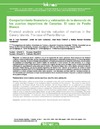Identificador persistente para citar o vincular este elemento:
https://accedacris.ulpgc.es/jspui/handle/10553/55441
| Campo DC | Valor | idioma |
|---|---|---|
| dc.contributor.author | González Hernández, Matías Manuel | en_US |
| dc.contributor.author | Boza Chirino, José | en_US |
| dc.contributor.author | De León Ledesma, Javier | en_US |
| dc.contributor.author | Lam González, Yen Elizabeth | en_US |
| dc.date.accessioned | 2019-05-20T13:22:14Z | - |
| dc.date.available | 2019-05-20T13:22:14Z | - |
| dc.date.issued | 2018 | en_US |
| dc.identifier.issn | 2539-2190 | en_US |
| dc.identifier.uri | https://accedacris.ulpgc.es/handle/10553/55441 | - |
| dc.description.abstract | La náutica de recreo constituye uno de los segmentos de mayor capacidad dinamizadora de los destinos turísticos costeros tradicionales, por las cualidades que ostenta para el desarrollo socioeconómico. En Canarias existen esfuerzos, conjuntos, de las administraciones públicas y privadas para potenciar el desarrollo del turismo, con el objetivo de posicionar al archipiélago como destino náutico de excelencia a nivel europeo. En este escenario, se le otorga especial atención a los puertos deportivos y marinas de la región; de este modo, se erigen como un activo principal las estrategias de especialización propuestas para el destino. El presente trabajo tiene como objetivo principal el estudio del puerto Pasito Blanco, uno de los puertos deportivos del destino Gran Canaria. En el artículo, se analiza la salud financiera en el periodo 2007-2013 y la satisfacción que tienen los usuarios con los atributos y servicios de la instalación, verificando si existe correspondencia entre estos aspectos. Los resultados permiten elaborar recomendaciones de utilidad práctica que contribuyan al mejor aprovechamiento de los recursos financieros del puerto y a elevar la eficiencia de su gestión integral. | en_US |
| dc.description.abstract | Recreational sailing has been defined as a strategic sector with great importance for the tourism development of coastal destinations because of the multiplying effect it generates for the economy. The sector is a key priority especially for the Canary Islands. Such is the conviction that the Canary Islands can be positioned as a nautical destination of excellence at a European level that public and private stakeholders are committed to specializing the destination and have clear strategies in place to manage this. In this context, ports and marinas are considered to be the most important capital base for nautical tourism, and are receiving a special attention within the regional strategies. This research aims to study the marina Pasito Blanco as one of the nautical tourism ports of the Archipelago. The paper analyses the financial situation from 2007 to 2013, and the perceptions the port users have concerning the attributes and services of this installation. The study also verify if the financial health of the firm is aligned with tourists ‘satisfaction, providing useful information in support to a more efficient and sustainable management of the industry. | en_US |
| dc.language | spa | en_US |
| dc.relation.ispartof | Teknos revista científica | en_US |
| dc.source | Teknos revista científica [ISSN 2539-2190], v. 18(1), p. 64-79 | en_US |
| dc.subject | 531290 Economía sectorial: turismo | en_US |
| dc.subject.other | Turismo náutico | en_US |
| dc.subject.other | Puertos deportivos | en_US |
| dc.subject.other | Salud financiera | en_US |
| dc.subject.other | Satisfacción | en_US |
| dc.title | Comportamiento financiero y valoración de la demanda de los puertos deportivos de Canarias. El caso de Pasito Blanco | en_US |
| dc.title.alternative | Financial analysis and tourists valuation of marinas in the Canary Islands. The case of Pasito Blanco | en_US |
| dc.type | info:eu-repo/semantics/article | en_US |
| dc.type | Article | en_US |
| dc.identifier.doi | 10.25044/25392190.939 | en_US |
| dc.identifier.eissn | 2539-2190 | - |
| dc.description.lastpage | 79 | en_US |
| dc.description.firstpage | 64 | en_US |
| dc.investigacion | Ciencias Sociales y Jurídicas | en_US |
| dc.type2 | Artículo | en_US |
| dc.utils.revision | Sí | en_US |
| dc.identifier.ulpgc | Sí | en_US |
| dc.contributor.buulpgc | BU-ECO | en_US |
| item.grantfulltext | open | - |
| item.fulltext | Con texto completo | - |
| crisitem.author.dept | GIR TIDES: Economía, medioambiente, sostenibilidad y turismo | - |
| crisitem.author.dept | IU de Turismo y Desarrollo Económico Sostenible | - |
| crisitem.author.dept | Departamento de Análisis Económico Aplicado | - |
| crisitem.author.dept | GIR TIDES: Economía, medioambiente, sostenibilidad y turismo | - |
| crisitem.author.dept | IU de Turismo y Desarrollo Económico Sostenible | - |
| crisitem.author.dept | GIR TIDES: Economía, medioambiente, sostenibilidad y turismo | - |
| crisitem.author.dept | IU de Turismo y Desarrollo Económico Sostenible | - |
| crisitem.author.dept | Departamento de Economía Financiera y Contabilidad | - |
| crisitem.author.orcid | 0000-0002-7503-928X | - |
| crisitem.author.orcid | 0000-0002-8494-8864 | - |
| crisitem.author.orcid | 0000-0002-4648-8924 | - |
| crisitem.author.parentorg | IU de Turismo y Desarrollo Económico Sostenible | - |
| crisitem.author.parentorg | IU de Turismo y Desarrollo Económico Sostenible | - |
| crisitem.author.parentorg | IU de Turismo y Desarrollo Económico Sostenible | - |
| crisitem.author.fullName | González Hernández, Matías Manuel | - |
| crisitem.author.fullName | Boza Chirino,José | - |
| crisitem.author.fullName | De León Ledesma, Javier | - |
| Colección: | Artículos | |
Visitas
151
actualizado el 20-abr-2024
Descargas
103
actualizado el 20-abr-2024
Google ScholarTM
Verifica
Altmetric
Comparte
Exporta metadatos
Los elementos en ULPGC accedaCRIS están protegidos por derechos de autor con todos los derechos reservados, a menos que se indique lo contrario.
